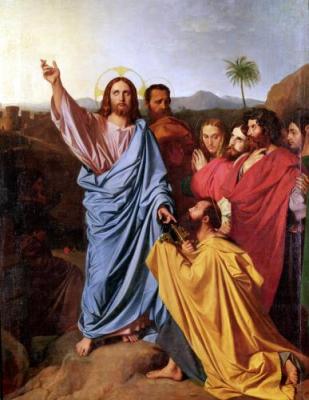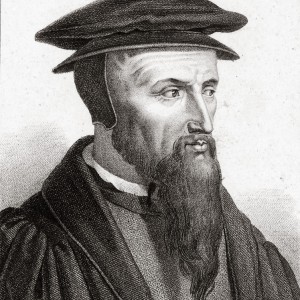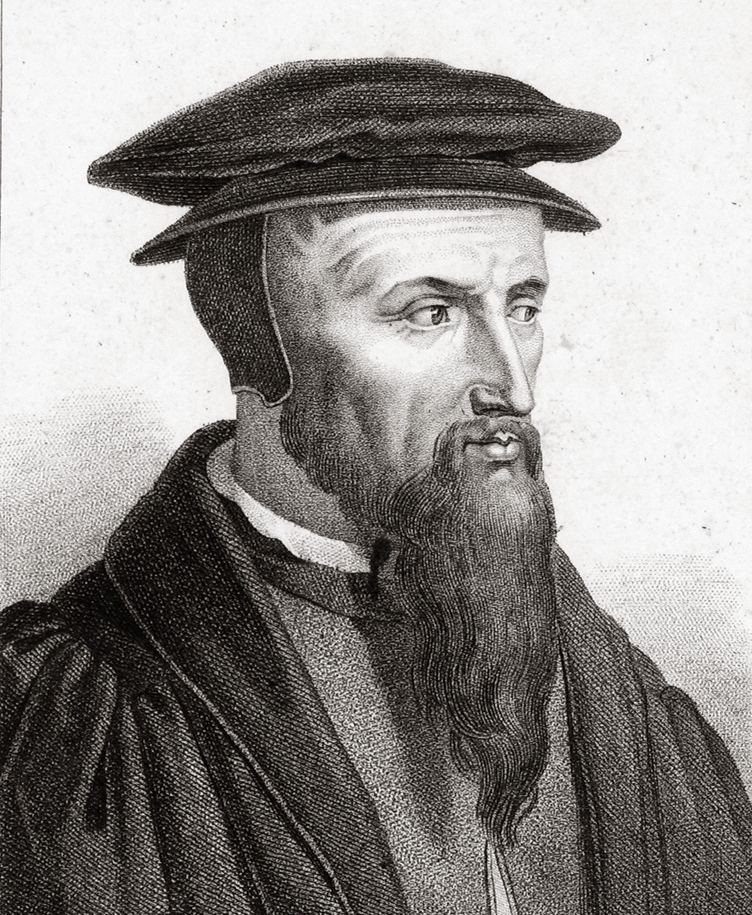Calvinism affirms two critical doctrines that are in apparent contradiction with one another. On the one hand, Calvinists claim that nobody falls permanently away from the faith. On the other hand, they claim that the entire Church fell away from the faith for generations, and that the Divinely-ordained Sacrament of the Lord’s Supper was destroyed, and replaced with a diabolical parody, the Eucharistic Sacrifice.
My argument is simple: there’s not a convincing or coherent way to explain how the entire global Church could lose the Sacrament, fall into idolatry, and become a “synagogue of Satan” without losing a member. You can’t lose the entire Church and not lose a single member.
Calvinism teaches “perseverance of the saints,” the doctrine popularly known within Evangelical circles as “once saved, always saved.” The idea is that God calls certain people (the elect) to salvation. These people may stumble or struggle in their faith, but it is literally impossible for them to permanently fall away. Here’s what the 1646 Westminster Confession has to say:
John Calvin I. They whom God hath accepted in his Beloved, effectually called and sanctified by his Spirit, can neither totally nor finally fall away from the state of grace; but shall certainly persevere therein to the end, and be eternally saved.
II. This perseverance of the saints depends, not upon their own freewill, but upon the immutability of the decree of election, flowing from the free and unchangeable love of God the Father; upon the efficacy of the merit and intercession of Jesus Christ; the abiding of the Spirit and of the seed of God within them; and the nature of the covenant of grace; from all which ariseth also the certainty and infallibility thereof.III. Nevertheless they may, through the temptations of Satan and of the world, the prevalence of corruption remaining in them, and the neglect of the means of their perseverance, fall into grievous sins; and for a time continue therein: whereby they incur God’s displeasure, and grieve his Holy Spirit; come to be deprived of some measure of their graces and comforts; have their hearts hardened, and their consciences wounded; hurt and scandalise others, and bring temporal judgments upon themselves.
The problem with Calvinists and Evangelicals holding to perseverance of the saints or “Once Saved, Always Saved,” is that they simultaneously believe that the entire Catholic Church fell away from the Gospel. The 1536 Geneva Confession, written personally by John Calvin, claimed that the entire Catholic Church, in following the pope, had ceased to be a church at all, becoming a “synagogue of Satan”:
Titian, John Calvin (16th c.) ARTICLE 18 – The Church
While there is one only Church of Jesus Christ, we always acknowledge that necessity requires companies of the faithful to be distributed in different places. Of these assemblies each one is called the Church. But in as much as all companies do not assemble in the name of our Lord, but rather to blaspheme and pollute him by their sacrilegious deeds, we believe that the proper mark by which we rightly discern the Church of Jesus Christ is that his holy gospel be purely and faithfully preached, proclaimed, heard, and kept, that his sacrament be properly adminisered, even if there be some imperfections and faults, as there always will be among men. On the other hand, where the Gospel is not declared, heard, and recieved, there we do not acknowledge the form of the Church. Hence the churches governed by the ordinances of the pope are rather synagogues of the devil than Christian churches.
ARTICLE 16 – The Holy Supper
The Supper of our Lord is a sign by which under bread and wine he represents the true spiritual communion which we have in his body and blood. And we acknowledge that according to his ordinance it ought to be distributed in the company of the faithful, in order that all those who wish to have Jesus for their life be partakers of it.
In as much as the mass of the pope was a reprobate and diabolical ordinance subverting the mystery of the Holy Supper, we declare that it is execrable to us, an idolatry condemned by God; for so much is it itself regarded as a sacrifice for the redemption of souls that the bread is in it taken and adored by God. Besides there are other execrable blasphemies and superstitions implied here, and the abuse of the Word of God which is taken in vain without profit or edification.
Such also was always the practice of the ancient Church, until the abomination of the mass was introduced, in which, in place of this communion of all the faithful, there was set up the horrible sacrilege that one man sacrifices for all. In this the Supper has been wholly destroyed and abolished.
 |
| Jean Ingres, Christ Giving the Keys to Peter (1814) |
These two contradictory doctrines within Calvinism are not ancillary. “Perseverance of the saints” is required, if Calvinism’s doctrines on monergism and the irresistibility of grace are true. But the Calvinist view of the apostasy of the Church is also required, or else, the Reformation becomes indefensible. That is, if the visible Church that Jesus Christ founded didn’t fall away into idolatry, Calvin and his followers are in serious trouble, since, as Calvin noted in Institutes, breaking off from a true Church is a serious offense against God:
However it may be, where the preaching of the gospel is reverently heard and the sacraments are not neglected, there for the time being no deceitful or ambiguous form of the church is seen; and no one is permitted to spurn its authority, flout its warnings, resist its counsels, or make light of its chastisements—much less to desert it and break its unity. For the Lord esteems the communion of his church so highly that he counts as a traitor and apostate from Christianity anyone who arrogantly leaves any Christian society, provided it cherishes the true ministry of Word and sacraments. He so esteems the authority of the church that when it is violated he believes his own diminished.
This also points to an even deeper problem. Calvin attempts to affirm God’s Sovereignty in a such a way that man lacks the capacity to resist or reject the will of God, while simultaneously claiming that this Sovereign God permitted (or caused) the Church that His Son founded to be destroyed and replaced by a synagogue of Satan.



I’ve never really been able to wrap my head around Calvinism, so hopefully someone could clarify this for me…
Could the Calvinist affirm that those early Christians were elect and did persevere, but then after a while, fake Christians entered the Church? The elect persevered but eventually died, leaving only the fake Christians, who were not part of the elect. This situation then continued for many centuries until the Gospel was “recovered” in the 16th Century. With the Gospel recovered, new elect were born, became Christians and persevered to the end.
Alternatively, could a Calvinist affirm that God saved people who were nevertheless in grave error concerning belief and Christian practice? Basically, can one be apostate AND saved? Can I commit idolatry and not understand the Gospel, yet by saved by the immutability of the decree of election? Could the “Synagogue of Satan” have Saints in it?
I’ve heard it said among my Reformed Calvinist acquaintances that “perseverance of the saints” and “once saved, always saved” are not the same thing. The explanation is too convoluted for me to convey here. Perhaps another reader here could lay it out for us?
Calvin, Luther, and (to a much lesser degree in my opinion) Zwingli, all represent a great loss to the Body of Christ in my opinion.
You have three very smart and clever theologians, who were also great leaders, who could get large movements going in the Church, and all three pointing out very horrible abuses and problems in the Church of their day, and offering solutions, which the Church eventually undertook at the Council of Trent, and then those three totally screwed things up royally, shattering the Body of Christ.
Martin Luther could have been up there with St. Francis and St. Dominic (Both of those gentlemen were reformers of the Church of their own day.) If things had gone just a little bit differently 500 years ago we could have been celebrating the feast of St. Martin Luther the Reformer today…
It comes down to arrogance and obedience with regard to Luther. Sts. Francis and Dominic, just like St. Ignatius, founder of the Jesuits, were all more or less reformers but they attacked apathy, wickedness, unfaithfulness, lack of charity, lack of zeal for Christ, and lack of love for His Mother in the Church, and they also attacked practices that crept in that had no place in the Catholic Magisterium but were rather impostors. Luther, on the other hand, was too arrogant for his own good and he had a problem with obedience. He judged not only apathy, wickedness, and all the rest, but rather, felt qualified to be the judge of the canon of Scripture, judge of its interpretation, judge of Church doctrine, judge of the Sacraments, judge of ecclesiology, judge of the Pope, judge of the Bishops, and yes, even the judge of other reformers (he got into nasty bouts with Henry VIII, Calvin, and Zwingli).
Arrogance and disobedience ultimately caused that little bit of difference you noted… Had he not had that, he could have been a simple, zealous, mighty Augustinian Reformer-Priest, St. Martin Luther the Just Reformer. But he questioned the principles on which the Church was founded, namely the Magisterium and the guidance of the Holy Spirit, and soon after that came tumbling down hundreds of other dogmas.
Hello Joe,
Thanks much for this post. Apparently, we’re on the same wavelength. See the second to last paragraph here.
In the peace of Christ,
– Bryan
Hey Bryan,
What do you make of my two suggested Calvinist responses above? Is this something they’d say? I don’t know how one would respond when presented with this dilemma. I know you understand this stuff… 🙂
God bless,
David.
I liked it: we really were on the same wavelength on this one, Bryan. Good response to his comment, by the way.
Hi Joe,
A thought provoking post for sure!
Back in March, 2009 I did a 3-part series on Calvin’s view of the visible Church and apostasy that I think you might be interested in:
Part 1
Part 2
Part 3
Grace and peace,
David
People, truly don’t , from the light of the original history – know how the great apostasy occurred:
https://www.youtube.com/watch?v=wJsQTMvWGvQ&t=22s